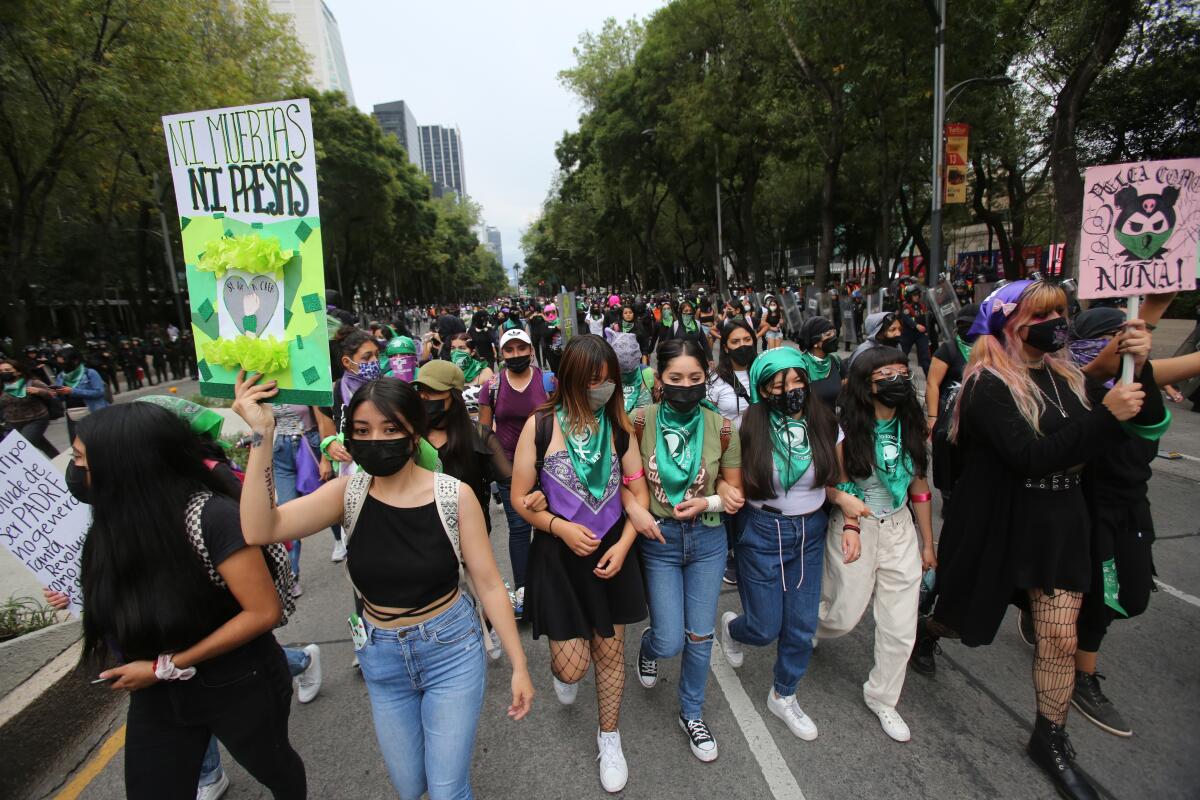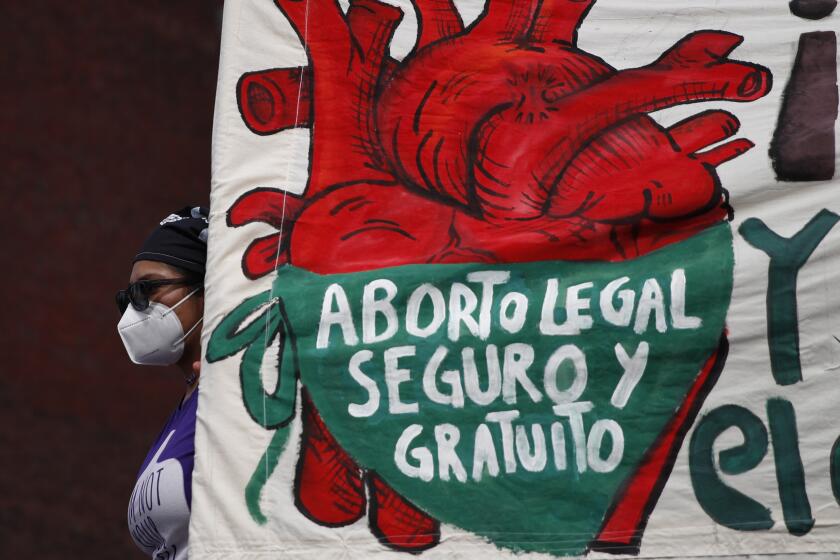Abortion access still difficult after historic Mexico ruling

- Share via
MEXICO CITY — Five months after Mexico’s Supreme Court ruled that criminalizing abortion was unconstitutional, a hospital in the southern state of Guerrero refused to perform an abortion on a 9-year-old rape victim.
The case is a recent example of what abortion advocates had warned of after the high court’s ruling last year: Until each state reforms its penal code, obstacles to safe and legal abortions will persist in much of the country.
It was only after the Guerrero girl’s case drew media attention and lawmakers and activists intervened that the state’s health secretary cleared the way for her abortion last month.
Guerrero is one of Mexico’s 26 states where changes have still not been made to state legal codes after the Supreme Court ruling in September. In January, three state lawmakers submitted a proposed bill to do just that.
The girl’s case roiled Guerrero in February. She was from a remote mountain community and was raped by a family member, who is also a minor.
Her grandparents and an aunt went to the state prosecutor’s office and then to a hospital in Chilpancingo, the state capital. Doctors there refused, noting that she was more than 12 weeks pregnant and it could risk her health, an assertion advocates disputed.
The refusal became a polemic in the state.
The Roman Catholic Church, which remains influential in Guerrero, objected to the girl having an abortion.
The Rev. Salvador Rangel Mendoza, bishop for the Chilpancingo-Chilapa diocese, said it shouldn’t have been allowed because life must be respected. He said the state’s health secretary “committed a murder.”
Mexico’s Supreme Court has ruled that it is unconstitutional to punish abortion.
Rangel Mendoza noted the “sociocultural circumstances” that lead to sexual abuse within families. “They go against an innocent creature, and why not against the person who impregnated her? Where is that person? He’s going to continue impregnating girls.”
Authorities opened an investigation, but advocates involved in the case said the other minor was not in custody.
Guerrero ranks high in Mexico for cases of sexual abuse, feminicides and teen pregnancy. Gender violence alerts have twice been declared in the state, triggering a mechanism to protect women’s humans rights. But in remote mountain communities, there is little government presence.
“There is a lot of resistance in institutions that have the obligation to attend to family and sexual violence against women,” said Marina Reyna Aguilar, executive director of the Guerrero Assn. Against Violence Toward Women.
Advocates say they’ve documented at least eight cases of girls and women, including one with a disability, who were denied abortions in the state in recent months after being raped.
Neil Arias Vitinio, legal advisor for the nongovernmental Tlachinollan Mountain Human Rights Center, said the issue is complicated in Guerrero because of institutional apathy, widespread impunity and absence of legislation. She said the girl’s case was an example of those forces at play.
Antiabortion groups lure in women by advertising abortions. Then the pressure campaign to continue pregnancy begins.
Authorities took notice only because the case gained traction in the press, she said. Most of the time cases never receive widespread attention and the victims’ rights are trampled because they occur in remote, poor communities where “nobody listens to them.”
Beatriz Mojica, a state lawmaker who got involved in the girl’s case, said “it is a serious problem.” She said decriminalizing abortion in the state codes was urgent because there are rape victims currently jailed, accused of terminating their pregnancies.
One such case was that of a 23-year-old woman from the Arcelia township. She was raped but has been jailed for six months, accused of murder after suffering a miscarriage.
“We mustn’t as a society allow that our girls are in this vulnerable situation,” Mojica said. “We have made and we continue making calls for lawmakers to do what we’re supposed to do — our responsibility is to guarantee the noncriminalization of our girls, teens and women.”
Mojica, along with lawmakers Gloria Citlali Calixto and Nora Velázquez, all of the ruling National Regeneration Movement party, proposed legislation in mid-January that would decriminalize abortion in the state’s penal code up to 12 weeks. That would be in line with similar laws in Mexico City, Hidalgo, Oaxaca, Veracruz, Baja California and Colima. The legislation remains in committee.
Velázquez said that shortly after filing the bill, public criticism flowed from politicians and activists opposed to abortion. The sponsors also received threats through social media.
A court ruling in Mexico is latest victory for abortion rights advocates in Latin America. But legal abortion still remains unavailable for most women.
She hoped the attention garnered by the girl’s case would spur the state legislature to reform the penal code this year. “We legislate for those who are suffering in their communities,” Velázquez said. “We aren’t promoting [abortion], we support legislation for the right to health, to justice, to human development.”
Ricardo Cano, an advisor for the National Front for the Family, which opposes abortion, said he objects to using the girl’s case to push for expanding access to abortions. He said passing such a legal reform “will leave the girls more vulnerable than ever.”
“To really eradicate the problem, you have to go after the victimizers, go after the rapists,” he said. “If Guerrero’s laws don’t subject these people to stronger sentences, the problem will still be there.”
Arias Vitinio, the advocate, also sees impunity in cases of rape as a major part of the problem in Guerrero, where police resist arresting accused family members even when there’s an arrest order. That institutional resistance also raised doubts for her about any legal reform’s impact. “It could be a dead letter,” she said, suggesting that it would just be ignored.
More to Read
Sign up for Essential California
The most important California stories and recommendations in your inbox every morning.
You may occasionally receive promotional content from the Los Angeles Times.












